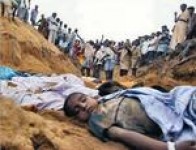Communicating disasters

Communicating Disasters: An
Introduction
"In a disaster, everyone is a victim in one way or another; no one is spared. We as media are not there to merely and dispassionately report. We invariably become a vital link between the scene of the disaster and the rest of the world."
"The under-reporting and non-reporting of many human interest and human development stories is a scandal. There are many silent emergencies that never attract sufficient media coverage or public attention…"
"As journalists, we¿ve been trained to do quick, sharp and precise stories that will have the most impact with our viewers. In doing so, we lose many nuances in a story like the Tsunami."
"If they want to engage the media, development professionals must first understand the complexity, nuances and diversity in what is collectively labeled as ¿media¿. In fact, the very term ¿media¿ is a plural!"
"The priority of development organisations arriving at disaster scenes is not primarily to communicate, but to respond to the emergency situation on the ground. This frustrates many journalists. It is therefore necessary for development organisations to see information as a ¿commodity¿…"
These were among the many wide-ranging observations and perspectives exchanged during an Asian regional brainstorming meeting held on 21 – 22 December 2006 in Bangkok, Thailand, on ¿Communicating Disasters: Building on the tsunami experience and responding to future challenges¿. Convened by TVE Asia Pacific and UNDP, the meeting brought together 33 leading media professionals, disaster managers and communication specialists from South and Southeast Asia to probe the role of the mass media and communication in times of disaster inspired crises and emergencies.
The meeting sought to discern the key communication lessons of the Indian Ocean Tsunami (December 2004),
Early on during the meeting, it became clear that both media practitioners and disaster/development professionals had different attitudes and approaches to managing information before, during and after disasters occur. Some of these arose from a failure to appreciate the different needs and priorities of these two groups. Yet, this division blurred as they agreed on the essential functions of information and communication, and recognised the need to serve the public interest over individual, corporate or agency interests.
The meeting agreed that the mass media must evolve their own ethics, guidelines and strategies for covering hazards and disasters, balancing the public¿s right to know with the right to privacy and human dignity of disaster affected persons. These cannot and should not be imposed from outside. At the same time, g






